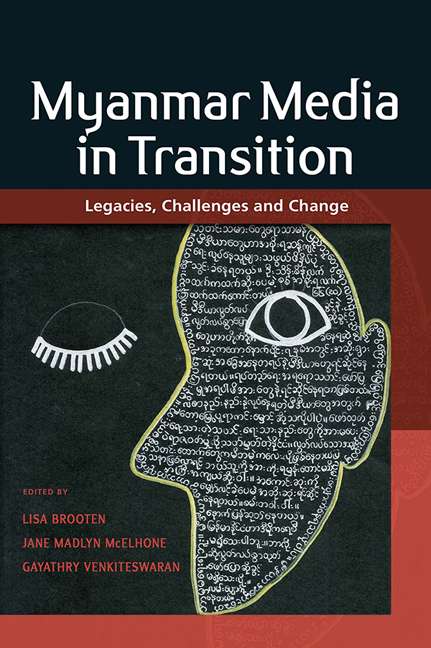Book contents
- Frontmatter
- Contents
- Contributors and Editors
- Burma or Myanmar? A Note on Terminology
- 1 Introduction: Myanmar Media Historically and the Challenges of Transition
- Part I Structural Constraints and Opportunities
- Part II Journalism in Transition
- 6 Silencing a Snakehead Fish: A Case Study in Local Media, Rural-Based Activism, and Defamation Litigation in outhern Myanmar
- 7 Precarity and Risk in Myanmar's Media: A Longitudinal Analysis of Natural Disaster Coverage by The Irrawaddy
- 8 Educating a New Generation of Watchdogs: Interview with Ye Naing Moe, Director of the Yangon and Mandalay Journalism Schools
- 9 The Metamorphosis of Media in Myanmar's Ethnic States
- 10 Covering Rakhine: Journalism, Conflict and Identity
- 11 Media in Myanmar: Laws, Military and the Public
- 12 Cracking The Glass Ceiling in Myanmar Media
- 13 Media and the 2015 General Elections
- Part III Creative Expression
- Part IV Society and Media
- Epilogue: Media Studies in Myanmar – Where Do We Go from Here?
- Index
8 - Educating a New Generation of Watchdogs: Interview with Ye Naing Moe, Director of the Yangon and Mandalay Journalism Schools
from Part II - Journalism in Transition
Published online by Cambridge University Press: 07 September 2019
- Frontmatter
- Contents
- Contributors and Editors
- Burma or Myanmar? A Note on Terminology
- 1 Introduction: Myanmar Media Historically and the Challenges of Transition
- Part I Structural Constraints and Opportunities
- Part II Journalism in Transition
- 6 Silencing a Snakehead Fish: A Case Study in Local Media, Rural-Based Activism, and Defamation Litigation in outhern Myanmar
- 7 Precarity and Risk in Myanmar's Media: A Longitudinal Analysis of Natural Disaster Coverage by The Irrawaddy
- 8 Educating a New Generation of Watchdogs: Interview with Ye Naing Moe, Director of the Yangon and Mandalay Journalism Schools
- 9 The Metamorphosis of Media in Myanmar's Ethnic States
- 10 Covering Rakhine: Journalism, Conflict and Identity
- 11 Media in Myanmar: Laws, Military and the Public
- 12 Cracking The Glass Ceiling in Myanmar Media
- 13 Media and the 2015 General Elections
- Part III Creative Expression
- Part IV Society and Media
- Epilogue: Media Studies in Myanmar – Where Do We Go from Here?
- Index
Summary
At Myanmar's first national media development conference in early 2012, keynote speaker Ye Naing Moe talked about meeting his wife's family. When asked about his job, he responded: “I'm a journalist.” And it was this answer that inspired a follow-up question from his future father-in-law: “I know you're a journalist, but what's your job?”
Ye Naing Moe is a veteran journalist, columnist, mentor and trainer. He started training Myanmar journalists underground in 2000, and then founded the Yangon Journalism School in 2009, followed by the Mandalay Journalism School in 2015. The schools have since trained more than eight hundred journalists and editors. In 2016 the Yangon Journalism School published Myanmar's first editors’ manual. To encourage local journalists to do investigative reporting, it is also helping to initiate the Myanmar Centre for Investigative Journalists.
Nai Nai and Myanmar Media in Transition contributing editor Jane Madlyn McElhone conducted a series of interviews with Ye Naing Moe between 2016 and 2018.
Q: You've trained and mentored hundreds of editors and journalists. What were the first big changes you noticed post-2010?
YNM: There were actually tectonic changes for the media industry before 2010. We need to start there. Although we had heavy censorship at that time, in 2007 the local media tried to cover the Saffron Revolution. But it was painful for journalists. They knew they couldn't publish their stories in their media outlets, but they still did the coverage. And if they wanted to try to publish their stories, first they had to give them to the government officers. But photographers still went out on the streets and they got the pictures. So did videographers and reporters. Youths across the nation were inspired by these local watchdogs. So it was a tectonic change. It was a revolution. And then there was Cyclone Nargis in early 2008. It shocked the whole nation. Once again, even though they knew they couldn't publish in-depth stories about the cyclone, the journalists went to the Delta region and tried to cover it. When their stories couldn't be published inside the country, they sent them to exiled media. So, even before 2010, there was a lot of tension between local media — editors and reporters — and government officials from the Ministry of Information. Even before the censorship board was abolished in 2012, local media were pushing the limits of journalism.
Information
- Type
- Chapter
- Information
- Myanmar Media in TransitionLegacies, Challenges and Change, pp. 201 - 209Publisher: ISEAS–Yusof Ishak InstitutePrint publication year: 2019
